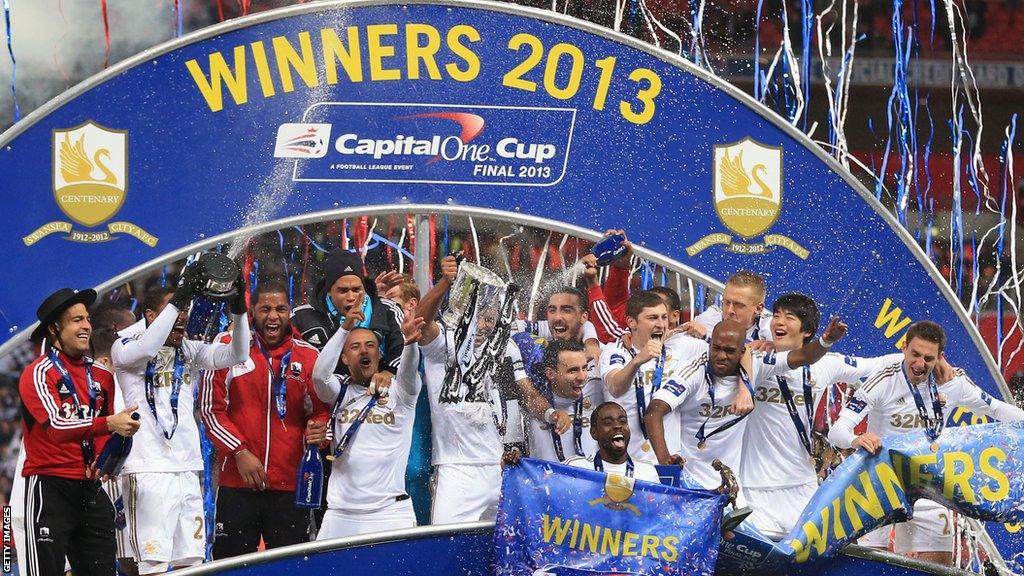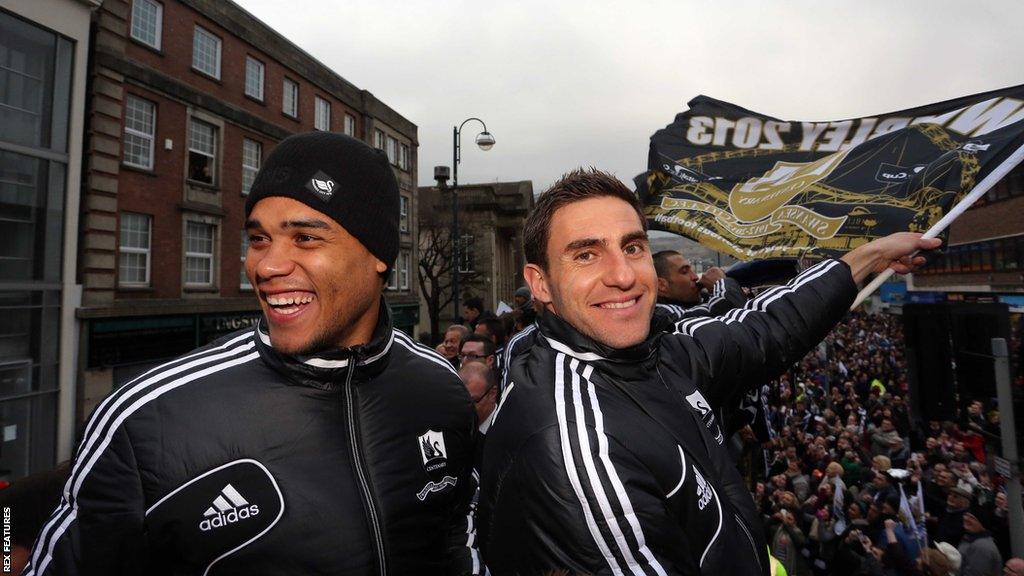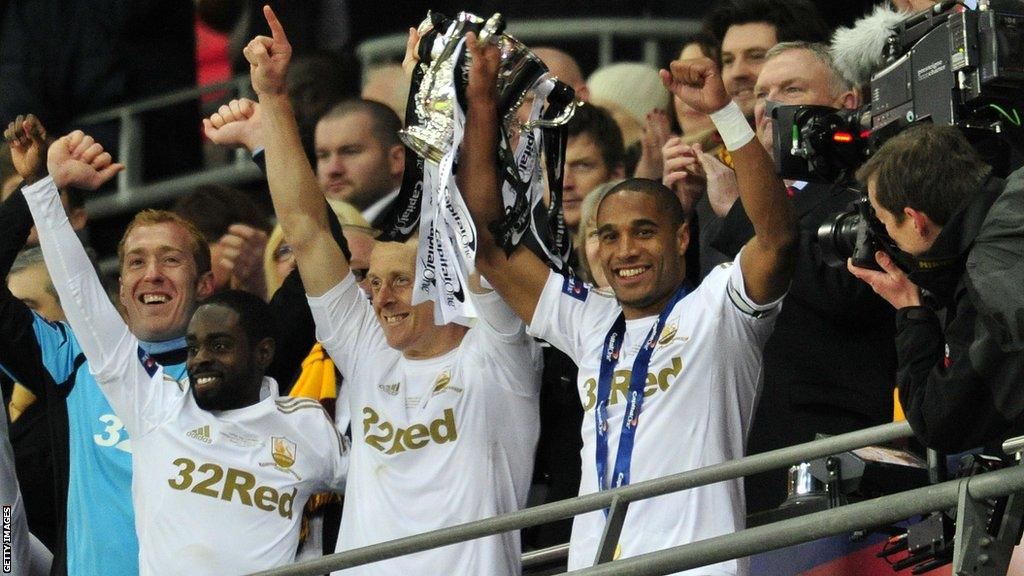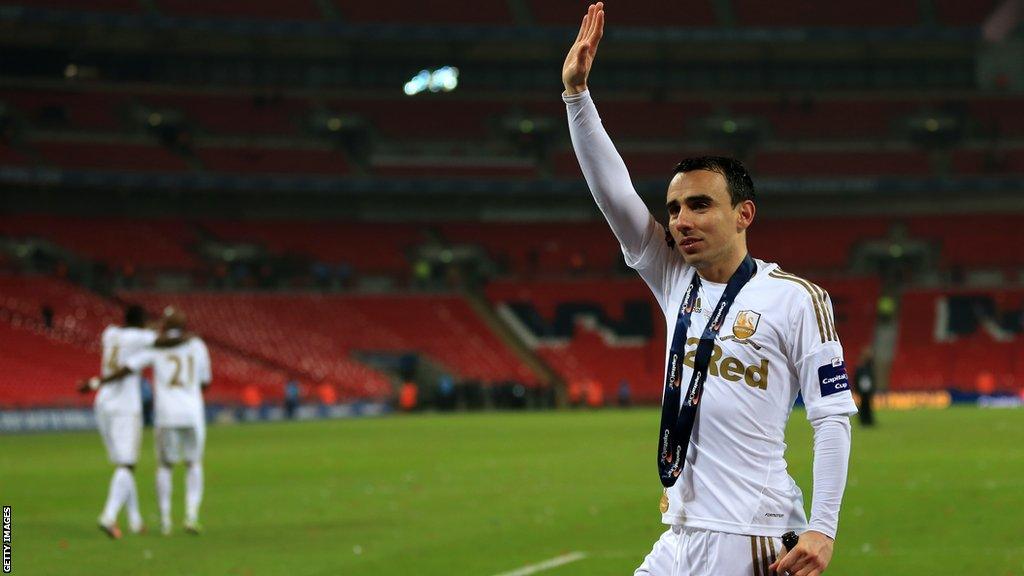When Michael Laudrup's Swansea City broke the mould in the EFL Cup
- Published

Michael Laudrup glances at the Capital One Cup, Swansea City's first - and to date only - major trophy
The Premier League and FA Cup may be bigger prizes, but the list of winners proves the EFL Cup is a trophy even the grandest clubs want to lift.
Liverpool were victorious last year, while Manchester City managed no fewer than six triumphs in the eight seasons before that.
The other winners in the last decade? Chelsea, in 2015, and two years later Manchester United, who will look to repeat the feat when they face Newcastle United in this year's final on Sunday.
The last time the EFL Cup went to a club who are not serial winners was in 2013 - when an unlikely triumph was overseen by a serial winner.
Laudrup's 'biggest achievement'
Swansea City were the last club outside the current 'big six' to win what was then the Capital One Cup, courtesy of a 5-0 final win over Bradford City on 24 February, 2013.
Their manager was Michael Laudrup, the Dane whose playing career featured spells at Barcelona, Real Madrid and Juventus.
Laudrup was a brilliantly gifted attacking midfielder whose sparkling CV features Serie A, La Liga and European Cup triumphs.
Hence Laudrup turned heads when he suggested a decade ago that Swansea's win over Bradford City - which secured the first major trophy in the Welsh club's history - was his greatest footballing achievement.
Yet Laudrup, now 58, insists his view has not changed.

Swansea's Capital One Cup victory led to a Europa League run which included a memorable 3-0 away win over Valencia
"How can you compare the League Cup with the Champions League (formerly the European Cup) and all the league titles in Spain and Italy? I don't compare it like that," he tells BBC Sport Wales.
"The Champions League is obviously the biggest competition, and a league title is [worth] more than a League Cup.
"But for a small club like Swansea that's not used to competing in the Premier League to arrive in the final and win the trophy - it will always be special.
"You know how much it will mean for the fans, for the club, for the city. That's why I said this was the most important achievement."
Swansea's success came 21 years after another Laudrup landmark at Wembley, when he helped Barcelona beat Sampdoria in the European Cup final.
Both wins were significant, he explains, because both involved breaking new ground.
"At the time Barcelona had never won the Champions League," Laudrup says.
"We won the final at Wembley and I still remember going back to Barcelona the day after.
"I think there were one million people on the streets because it was the first time we won it. Since then they have won it four or five times, but the first time is special.
"It was the same for Swansea. I remember saying to the players that they had to take their chance, because it will stay in the history book of football."
From minnows to major trophy winners

Michel Vorm (left) celebrates on Swansea's Capital One Cup winners' bus parade with Angel Rangel, one of the players who had played for the club in the lower leagues
A decade before facing Bradford, Swansea had to win on the last day of the season to avoid dropping out of the Football League.
Eight years later, in 2011, they completed an extraordinary rise through the divisions by beating Reading in the Championship play-off final.
Brendan Rodgers' team settled well in the Premier League, but there were concerns about what would come next when he left for Liverpool in 2012.
Swansea turned to Laudrup, who would maintain Premier League momentum while also making it clear from the start that he wanted to progress in the cups.
Laudrup had previous, having led unfancied Getafe to the Copa del Rey final during his time coaching in Spain, while his enduring quality on the training field brought instant respect among Swansea's players.
"I remember the first session we had with him, we were doing attack against defence," says former Swansea right-back Angel Rangel.
"Our attacking players couldn't score a goal so Laudrup joined in. The first ball he touches, he played a pass through for Wayne Routledge to score one-v-one. We were all clapping.
"You have to give respect to your manager when that happens, because he is better than you."
Swansea's League Cup run began with victory over Barnsley, before a last-minute Garry Monk goal at League One Crawley saw the Welsh club scrape through having trailed in the closing stages.
A memorable victory over Rodgers' Liverpool at Anfield put Swansea into the last eight of the competition for the first time, and they progressed again thanks to a scrappy 1-0 win over Middlesbrough.
Yet the semi-final draw took wind from Swansea's sails. League Two Bradford, conquerors of Arsenal during their remarkable run, and Aston Villa were possible opponents, but Swansea got Chelsea.
"I was fuming," says ex-Swansea defender Ashley Williams.
"All we wanted was to get to Wembley. We felt we could beat Villa and we would beat Bradford.
"But I remember my agent was buzzing that we got Chelsea. He said 'if you beat them, you've won the cup'."
The Bridge - and the ball boy

Ashley Williams (right) lifts the Capital One Cup with club captain Garry Monk, who came off the bench in the final
Chelsea were Champions League and FA Cup holders, and would go on to win the 2012-13 Europa League under Rafael Benitez.
The likes of Ashley Cole, Frank Lampard, Fernando Torres, Oscar and Eden Hazard featured over the two legs against Swansea, a club whose most notable previous knockout triumphs had come in the Football League Trophy.
"Chelsea were top class, with Hazard as the big star," Laudrup says.
"To win at Anfield was fantastic and the final was great but, when I look back, I think the most incredible moment in our run was to beat that Chelsea team.
"That was really something."
Swansea took control of the semi-final in the first leg, when Branislav Ivanovic gave away possession and Michu - the Premier League's signing of the season - produced a typically classy finish from outside the box.
"Michu was just a normal lad with his hoodie and his Converse on," Rangel says.
"He was so humble off the pitch, I think that gave him the platform to perform on the pitch. He was a grafter who took the rewards in front of goal."
When Danny Graham took advantage of another uncharacteristic Ivanovic error to make it 2-0, Swansea were firmly in control of the tie after 90 minutes.
They managed another clean sheet in a goalless second leg, a game which is best remembered for Hazard's clash with a ball boy which saw Chelsea's talisman sent off.

Eden Hazard received one of the more unusual red cards in League Cup history after his tangle with ball boy Charlie Morgan
Charlie Morgan was the son of a Swansea director who had been a ball boy as a youngster. He returned to action for the Chelsea tie despite being something of a veteran in ball boy terms.
"I have known Charlie for years because I am friends with his dad, Martin," says former Swansea midfielder Leon Britton.
"I don't think he was a ball boy at the time. They brought him back for that game - maybe they were short.
"Maybe a couple of the kids pulled out and he had done it before. He was a little bit older.
"He just so happened to be behind the goal we were defending in the second half."
Britton cannot help but smile as he tells story of Morgan's intervention, when the ball went out of play he did not immediately return it.
Instead he lay on the ball, Hazard tried to kick it out from beneath him and, after a melee, the Belgian was shown a red card.
"You could see him on the floor holding the ball and Hazard gives him a boot," Britton says.
"I don't know how much pain Charlie was in, it looked like a lot. Maybe he had been watching a lot of Premier League football."
There were 10 minutes remaining as Hazard walked off, but the tie was over.
"Charlie Morgan helped us take a breath," Rangel says. "That's what Swansea's about. It's not just the players, it's the whole club, the whole city."
Comparing medals with Mikel

The 2013 Capital One Cup is the one major honour won by the majority of Swansea's squad, including Michu (left) and Ben Davies (right)
Bradford's eye-catching run to the League Cup final saw them beat League One Notts County, Championship Watford and fellow League Two side Burton before they defeated Premier League Wigan Athletic on penalties.
After another shootout victory over Arsenal in the last eight, Phil Parkinson's side beat Aston Villa 3-1 in the semi-final first leg and secured their Wembley trip with a 2-1 loss at Villa Park in the second.
Yet any hope of another upset in the final was rapidly wiped out by Laudrup's ruthless Swansea, who went ahead early on through Nathan Dyer and were 2-0 up thanks to a Michu goal before half-time.
Dyer added a second before Bantams keeper Matt Duke was sent off early in the second half, with Jonathan de Guzman scoring the penalty which followed and adding a fifth goal late on.
"I have spoken to so many players who were better than me but didn't achieve in their careers what we achieved that day," says ex-Wales captain Williams.
"There are some massive clubs who have not won trophies for a long time, some great players who never won a medal.
"When you look and put it in perspective, it was just an amazing time to be a Swansea player."
Swansea's players celebrated their victory long into the night in Whisky Mist, a high-end London club.
Also there that evening, by coincidence, was Jon Obi Mikel, the then Chelsea midfielder who won two Premier Leagues, four FA Cups, two League Cups, the Champions League and the Europa League with the Blues.

Leon Britton's medal remained around his neck long after the final whistle at Wembley
"I wore my medal out - I was chuffed, you know," Britton says.
"I was showing it Jon Obi Mikel. He was probably thinking 'what's that - oh it's one of those four I have got at home… it's not a Champions League medal is it?'.
"I think he just laughed and must have thought 'who is this little fella?'."
Britton's medal is now in a frame alongside his match shirt, one of the few he has kept from the key moments in a 16-year Swansea career.
It is a similar story for Rangel, while Williams' medal - like all his playing mementoes - is now looked after by his mum.
Laudrup, though, is not sure where his has gone.
"I have my medals somewhere, but I don't know where," he says.
"I have my memories, and they are much more important."